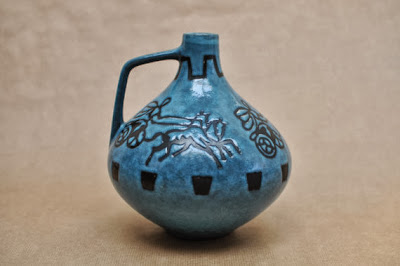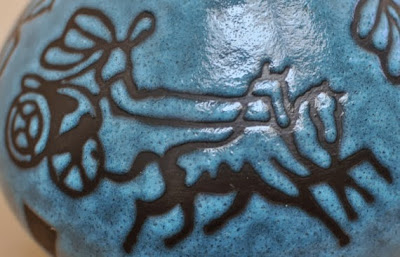Remember the classic
Egyptian inspiration for this Uebelacker vase that I wrote about a
few weeks ago? Well, I have another German take on the classics for you today!
As we have had
amazing autumn weather for the last two weeks, we decided to pick up my parents
(who love a bit of antique-hunting themselves - I didn't get this passion from
a stranger) and drive to Germany for the last few outdoor markets of this year.
These treasure hunts
are what made me start collecting and selling vintage goodies in the first
place. The thrill of the find, the feeling of anticipation and excitement on
the way to the first market; you never know what you might find. We've had
times when we came away with one small vase, but luckily we've also had trips
were we returned with a car full of goodies.
This time we found
some lovely items, the weather was good, it was great to spend time with my
parents, people understood my German, and we had a Bratwurst. What more can one
wish for?
One of the most
enjoyable finds was this stunning baby blue vase with a décor of horse-drawn
chariots, made by Jopeko. We found this beauty on the biggest market of the day, which mostly had people selling new
items, and only a few sellers of used items. It is always difficult to predict
if this will be the case in Germany, as both types of markets are called
Trödelmarkt.
 |
| Jopeko 509-18, design from 1958 |
Even though this
market didn't seem to be what we were looking for, we still decided to do a
quick round, and at the last stand I spotted this vase, standing at the back of
the stall. The lady who sold the vase told us that it was given to them by a Greek
neighbor, and told them that it was a souvenir from Greece! At that time I
couldn't read the markings on the vase, but I was still pretty sure that it was
a fifties or sixties vase made by a West-German factory, so I bought it anyway.
When we came home,
and it was time to do a bit of research, I found out that the vase is actually
marked Foreign on the bottom, and not the usual West-Germany. I'm still wondering if the neighbor did actually buy the vase
in Greece and brought it back to Germany, or if he bought it in Germany and didn't tell them or the
story was remembered incorrectly.
 |
| Greek Amphora, British Museum |
My first hunch,
based on the shape of the vase, was that it was made by Kreutz or possibly by
Jopeko. The sweet folks on the Pottery and Glass forum helped me out again, and they confirmed that it was indeed made by Jopeko. The
shape of the vase was designed in 1958. This décor can also be found in black
on red, and black on brown, even though in that case the chariots are in
relief, and not impressed, as is the case with this example.
The image of
horse-drawn chariots was of course based on decorations on ancient Greek and Roman vases, and this masculine,
powerful image was often used on
West-German pottery, for example by Ruscha on wall-plaques and by Scheurich on
floor vases.
The black on the light blue background works extremely well, and the slender handle make this a very elegant vase. Although the decoration is clearly inspired by the classics, the shape is quite innovative, and very Mid Century Modern.
I would love to hear if you have any clues if the vase might actually have come from Greece, if you have similar stories, please leave a comment!


No comments:
Post a Comment